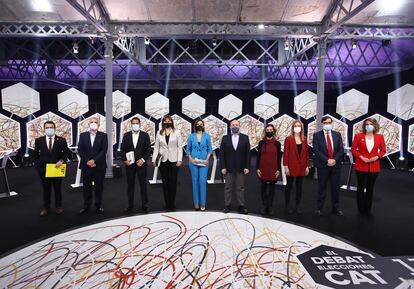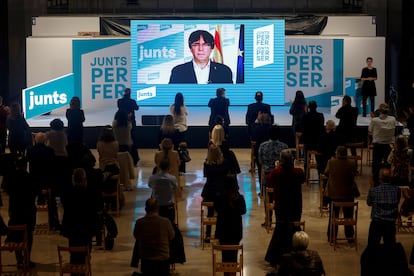Candidates clash in acrimonious debate ahead of Catalan regional elections
Pro-independence forces pledge not to negotiate with the Socialist contender Salvador Illa, who was the target of most of the attacks during the televised war of words

Candidates for the Catalan regional election sparred Thursday night at the last televised debate before voters go to the polls on Sunday. Former Health Minister Salvador Illa was the target of most of the attacks, reflecting that surveys show a tie between his Catalan Socialist Party (PSC) and separatist groups.
The nine contenders exchanged insults ranging from “fascist” to “terrorist” and the debate at times descended into a shouting match, with moderator Ana Pastor struggling to contain the speakers.
The election campaign in Spain’s northeastern region, where nearly six million people are eligible to vote, has been marked by the coronavirus pandemic. Applications for mail-in ballots have tripled since the previous election in 2017, according to the postal service. And a quarter of the 82,251 citizens who were randomly selected to man the voting stations have requested to be excused from their duty, reflecting widespread fear about contracting the virus.
Of course I haven’t been vaccinated. I hope you will apologize to Catalans. This is the kind of thing I want to change: the confrontation, the liesSalvador Illa, Socialist candidate for Catalan premier
The Catalan government had tried to postpone the election to a later date citing the poor epidemiological situation in the region, where the 14-day cumulative number of cases per 100,000 inhabitants is 375, lower than the national average of 540 but well above the threshold for a high-risk scenario.
But a court decided to keep the February 14 date, with critics of the regional government suggesting that the requested change had more to do with the fact that the Catalan Socialist Party (PSC) had just nominated Salvador Illa, then serving as the Spanish health minister, to be its top candidate, in a move that gave the party a boost in voter intention.
Since then, all the other contenders have treated Illa as the candidate to beat, and this strategy was on clear display at the two-hour debate on Thursday, organized by the private television station La Sexta. Illa was the target of numerous verbal attacks from the other candidates to head the region, which is currently governed by a separatist coalition of the Catalan Republican Left (ERC) and Together for Catalonia (Junts).
The latest opinion polls show a triple tie between the PSC (around 22% of the vote), Junts (between 20 and 21%) and ERC (20%). Meanwhile, both the conservative Popular Party (PP) and the liberal Ciudadanos (Citizens) – which technically won the most votes at the last election but failed to form a government – have gone down in voting intention, while the far-right Vox and the far-left CUP have gone up.
There are five parties that could secure between 5% and 9% of the vote, making forecasts particularly difficult. Undecided voters could make the difference, and this explains the harsh tone seen at the debate.
Shouting match
The attacks began straight away when Laura Borràs (Junts), Carlos Carrizosa (Citizens) and Alejandro Fernández (PP) all demanded that Illa wear a facemask due to the fact that he refused to take a coronavirus test ahead of an earlier debate on regional Catalan television channel TV3. Since then, both right-wing and pro-independence politicians have been circulating unfounded claims that Illa may have cheated his way into early Covid-19 vaccination and that this would explain his refusal to be tested. The Health Ministry has refuted this claim.
The former minister hit back: “Anything goes against Illa, even defamation. Of course I haven’t been vaccinated. I hope you will apologize to Catalans. This is the kind of thing I want to change: the confrontation, the lies.”
But the mood was tense from the beginning and it escalated from there, with participants trading insults ranging from “fascist” to “terrorist.” Pere Aragonès of ERC, who is currently the acting premier of Catalonia after Quim Torra was barred for disobedience, said that Illa reminded him “of [former US president] Donald Trump.”

Laura Borràs of Junts warned that if Illa becomes the Catalan premier, the region will be governed directly from Madrid. The Socialist candidate retorted that if Junts wins, it will be Carles Puigdemont who runs the region from the Belgian city of Waterloo, where he fled to escape arrest after leading the failed unilateral secession attempt of late 2017. Puigdemont heads the Junts list, but if the party wins Borràs would be the candidate to serve as regional premier.
Meanwhile, Ignacio Garriga of Vox promised to end “the ideological ravings” of the independence parties, accusing them of cutting back on public healthcare spending. “If doctors in Catalonia did not have facemasks, it’s because you’ve been robbing Catalans for decades and using the money to fund your parties and Puigdemont’s mansion,” he said.
Aragonès told Garriga that “I know you would prefer to see me in jail, but you’re going to have to wait a long time. We have always stopped the far right, and on February 14 there’s going to be an anti-fascist vote.”
A difficult outcome
Polls suggest that separatist parties could collectively gain a majority on Sunday, but it would force Junts and ERC to renew a governing formula that has been marked by constant clashes between both partners. And they would still require additional support from smaller parties.
Carlos Carrizosa of Ciudadanos was the only candidate to defend an agreement between “constitutionalist” parties, loosely defined as those that accept the Spanish Constitution of 1978 and did not participate in, or support, the 2017 breakaway attempt.
Independence parties have reaffirmed that they will not negotiate with the Socialists no matter what the outcome of the vote. This pledge has been put down in writing and published on social media by a small, recently created secessionist group named Catalans per la independència (Catalans for independence) with ties to ANC, a civil society group whose leader Jordi Sànchez was convicted and jailed in connection with the 2017 secession attempt. In this document, Junts, ERC, CUP, PDeCAT and Primàries Catalunya promised that “in no case will the formation of government be negotiated with the PSC.”
With reporting by Elsa García de Blas, Camilo S. Baquero and Cristian Segura.
English version by Susana Urra.
Tu suscripción se está usando en otro dispositivo
¿Quieres añadir otro usuario a tu suscripción?
Si continúas leyendo en este dispositivo, no se podrá leer en el otro.
FlechaTu suscripción se está usando en otro dispositivo y solo puedes acceder a EL PAÍS desde un dispositivo a la vez.
Si quieres compartir tu cuenta, cambia tu suscripción a la modalidad Premium, así podrás añadir otro usuario. Cada uno accederá con su propia cuenta de email, lo que os permitirá personalizar vuestra experiencia en EL PAÍS.
¿Tienes una suscripción de empresa? Accede aquí para contratar más cuentas.
En el caso de no saber quién está usando tu cuenta, te recomendamos cambiar tu contraseña aquí.
Si decides continuar compartiendo tu cuenta, este mensaje se mostrará en tu dispositivo y en el de la otra persona que está usando tu cuenta de forma indefinida, afectando a tu experiencia de lectura. Puedes consultar aquí los términos y condiciones de la suscripción digital.








































